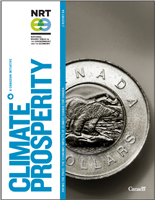Paying the price: the economic impacts of climate change for Canada
Posted by Craig Clarke
on Nov 13, 2011

Unless global greenhouse gas (GHG) emissions are brought down and Canada invests in adaptation, the economic impacts of climate change on Canada could climb to billions of dollars per year according to a report released by the National Roundtable on the Environment and the Economy (NRT).
Paying the Price: the Economic Impacts of Climate Change for Canada – the fourth report in the NRT’s Climate Prosperity series – is the first national study to show what the economic consequences to Canada could be as a result of climate change, under four separate scenarios involving two factors: global GHG emissions and Canadian economic and population growth.
Although Canada contributes approximately 1.5% of global emissions, the report concludes that climate change impacts brought about by increased world-wide emissions have a real and growing economic cost to Canada. It also shows that adaptation – our capacity to manage the impacts to come – while not cost-free, is a cost-effective way to alleviate some of those impacts.
Based on NRT original economic modelling, the report finds that the economic impact on Canada could reach:
- 2020: $5 billion per year
- 2050: Between $21 and $43 billion per year
In the 2050s:
- Timber supply impacts could range from $2 billion to $17 billion per year with high impacts in B.C.
-
Flooding damages to coastal dwellings, resulting from climate change-induced sea-level rise and storm surges, could cost between $1 billion to $8 billion per year with higher than average cost impacts in Atlantic Canada
-
Poorer air quality resulting from higher temperatures will lead to more hospital visits, resulting in millions of dollars in costs to local health care systems for four of Canada’s major cities – Toronto, Montréal, Vancouver and Calgary
The NRT also assessed if cost savings would occur as a result of proactive climate adaptation measures such as enhanced forest fire management and restricting coastal development in flood-prone areas. The report concludes that adaptation can save money by reducing the physical and economic impacts of climate change. The economic benefits of investing in adaptation outweighed the costs of simply letting rising climate impacts and costs occur in most instances.
“Climate change has a price tag and it could be expensive,” said NRT President and CEO, David McLaughlin. “While our report makes it clear that getting global emissions down is both in our economic and environmental interest, it also shows that adaptation is key in reducing impacts on people, places and prosperity.”
Specific recommendations include further investment by the Government of Canada in increasing our country’s expertise in the economics of climate change impacts and adaptation, and further use of economic analysis to inform allocation of adaptation funding. The report also recommends that all levels of governments continue investing in producing and disseminating research to guide adaptation decision-making by business, communities, and individuals.
About the NRT
In 1988, the NRT was established to bring “leadership in the new way we must think of the relationship between the environment and the economy and the new way we must act.” In 1993, Parliament legislated its mandate setting out in statute the NRT’s uniquely independent, national policy advisory role on sustainable development
The NRT focuses on sustaining Canada’s prosperity without borrowing resources from future generations or compromising their ability to live securely.
It raises awareness among Canadians and their governments about the challenges of sustainable development and advocates for positive change. It strives to promote credible and impartial policy solutions that are in the best interest of all Canadians.
It accomplishes this mission by fostering reports on priority issues and by offering advice to governments on how best to reconcile and integrate the often divergent challenges of economic prosperity and environmental conservation.
The NRT brings together a group of distinguished sustainability leaders active in businesses, universities, environmentalism, labour, public policy, and community life from across Canada. Members are appointed by the federal government for a mandate of up to three years. It also reaches out to expert organizations, industries, and individuals to assist in conducting its work on behalf of Canadians.
The NRT reports, at this time, to the Government of Canada and Parliament through the Minister of the Environment.
Interested in being a sponsor?
Download the website sponsorship guide
Download the website sponsorship guide


